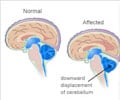Brain surgery saved the 10-year-old boy from York. But a bonus was a new accent, southern, upper class. Everyone is baffled. None is able to explain how it came about.
William McCartney-Moore fell seriously ill with a rare strain of meningitis last March and had an operation to remove the fluid that had collected in his brain.But in the weeks since his treatment, William has lost his northern twang and acquired the elongated vowels of received pronunciation (RP).
His mother, Ruth McCartney-Moore, said: "He survived the operation and the most amazing thing is that he came out of surgery with a completely different accent."
The family first noticed the change in William's accent after he left hospital in April: "We went on a family holiday to Northumberland and he was playing on the beach and he said 'Look, I've made a sand castle' but really stretched the vowels, which made him sound really posh."
"We all just stared back at him — we couldn't believe what we had heard because he had a northern accent before his illness. He had no idea why we were staring at him — he just thought he was speaking normally."
William's illness began with a headache and a high temperature, she said. "A few days later he had a massive seizure."
Advertisement
Empyema is a condition in which pus and fluid from infected tissue collects in a body cavity.
Advertisement
"He lost everything. He couldn't read or write, he couldn't recognise things and he'd lost all his social skills."
But 18 months on, William has made a near-total recovery.
His mother added: "It's bizarre, but I think it has worked in his favour because we all smile when he does it and it has brought a bit of humour into the situation."
Phil Edge, the head of therapy services for international charity Brainwave, said it is rare for a child to change accents after surgery.
"Some people believe … that the [brain] cells that are damaged can't be replaced and other cells take over — so here he has re-learned how to speak with a different accent.
"It is not very common, I have worked here 20 years and can't think of an instance where a child has spoken with a different accent after surgery."
Source-Medindia
GPL/C










